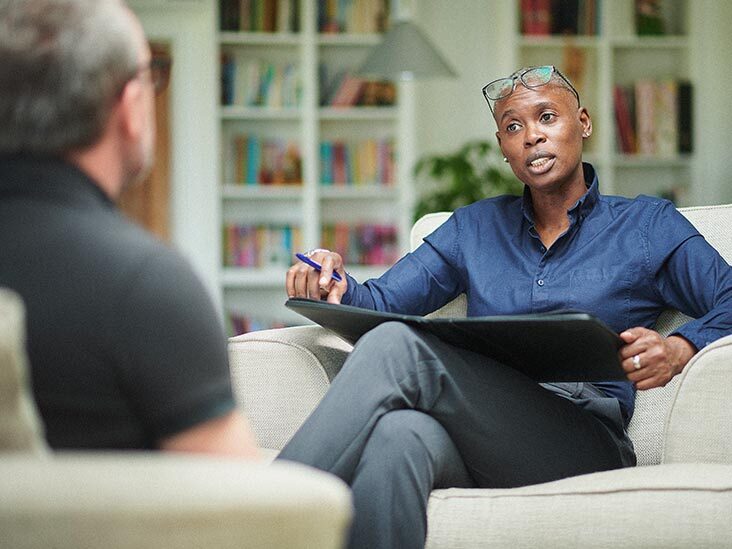Anxiety is one of the most common mental health disorders in the world, affecting millions of people every year. If you are one of those people, you may be looking for anxiety counseling. This guide will provide you with all the information you need to make an informed decision about whether or not anxiety counseling is right for you. We will discuss what anxiety counseling is, how it works, and the benefits that it can offer. We will also look at some of the potential risks and side effects associated with this type of therapy.
Contents
What Is Anxiety Counseling?
 Anxiety counseling is a type of therapy that aims to help individuals manage their anxiety. It can be used to treat a variety of conditions, including panic disorders, phobias, social anxiety disorder, and generalized anxiety disorder.
Anxiety counseling is a type of therapy that aims to help individuals manage their anxiety. It can be used to treat a variety of conditions, including panic disorders, phobias, social anxiety disorder, and generalized anxiety disorder.
Anxiety counseling typically focuses on helping the individual identify and cope with the thoughts and behaviors that contribute to their anxiety. It may also involve teaching relaxation and stress-management techniques.
This type of counseling is very effective for many people, as it can help them to understand and manage their anxiety more positively. If you are struggling with anxiety, consider seeking out anxiety counseling from a qualified therapist. It could be the first step in regaining control of your life.
People may use this type of counseling to learn how to:
- Cope with anxiety-provoking situations
- Handle panic attacks
- Reduce stress
- Manage their thoughts and emotions
- Change their behavior patterns
Anxiety counseling can take many different forms, but most often it is conducted as one-on-one therapy sessions with a qualified therapist. Counseling for anxiety may also be conducted in group settings, or through online programs.
Anxiety counseling is an effective treatment for many people struggling with anxiety disorders. If you are looking for help managing your anxiety, consider seeking out anxiety counseling from a qualified therapist. It could be the first step in regaining control of your life.
Different Types of Anxiety Counselling

There are many different types of anxiety counseling, and the type that is right for you will depend on your specific needs. Here are some of the most common types of anxiety counseling:
Cognitive Behavioural Therapy (CBT)
Cognitive behavioral therapy is a type of therapy that focuses on helping you to change the way you think and feel about your anxiety. This type of therapy can be very effective in helping you to manage your anxiety and live a more normal life. CBT works by helping you to identify the thoughts and beliefs that are causing your anxiety and then helping you to change them. People may need to see a therapist for several sessions before they start to see results.
Exposure Therapy
Exposure therapy is another type of therapy that can be very effective in treating anxiety. This type of therapy works by gradually exposing you to the things that you are afraid of. As you become more exposed to your fears, you will start to feel less anxious about them. Exposure therapy can be done with or without the help of a therapist.
Psychodynamic Therapy
Psychodynamic therapy is a type of therapy that focuses on helping you to understand the unconscious thoughts and feelings that are causing your anxiety. This type of therapy can help identify the root causes of your anxiety and then work through them. Psychodynamic therapy usually requires people to see a therapist for several sessions.
Supportive Therapy
Supportive therapy is a type of therapy that focuses on providing support and guidance to people with anxiety. This type of therapy can help provide people with the tools they need to manage their anxiety. Supportive therapy usually requires people to see a therapist for several sessions.
Meditation and Relaxation Techniques
Meditation and relaxation techniques are other ways to help manage your anxiety. These techniques can help you to calm your mind and body, and they can also help you to learn how to control your thoughts and emotions. Meditation and relaxation techniques can be done on your own or with the help of a therapist.
Acceptance and Commitment Therapy (ACT)
Acceptance and commitment therapy is a type of therapy that focuses on helping you to accept your anxiety and learn to live with it. This type of therapy can help teach you how to control your thoughts and emotions. ACT usually requires people to see a therapist for several sessions. Through this type of therapy, you can learn to accept your anxiety and live a more normal life.
These are just some of the different types of anxiety counseling that are available. If you are struggling with anxiety, it is important to talk to a therapist or counselor about the best type of therapy for you.
Is Anxiety Counselling Effective?
 The effectiveness of anxiety counseling can vary depending on the severity of your anxiety and how long you have been struggling. Generally, the earlier you seek help, the better the chances are that anxiety counseling will be effective. If your anxiety is milder, you may only need a few sessions to see results. However, if your anxiety is more severe, it may take longer to see improvements.
The effectiveness of anxiety counseling can vary depending on the severity of your anxiety and how long you have been struggling. Generally, the earlier you seek help, the better the chances are that anxiety counseling will be effective. If your anxiety is milder, you may only need a few sessions to see results. However, if your anxiety is more severe, it may take longer to see improvements.
Anxiety counseling can also be combined with other treatments, such as medication or lifestyle changes, for better results. If you are thinking about starting anxiety counseling, speak to your doctor or mental health professional about what would be best for you. Many reports suggest that anxiety counseling is effective, but not everyone will respond to treatment in the same way.
If you are considering anxiety counseling, it is important to choose a therapist that you feel comfortable with and who has experience treating anxiety. It is also important to be patient and understand that it may take some time to see results. Anxiety counseling can be an effective way to manage your anxiety and improve your quality of life.
What Happens During Anxiety Counselling?
Anxiety counseling usually involves talking with a therapist about your thoughts, feelings, and behaviors. The therapist will help you understand your anxiety and how it’s affecting your life. They can also teach you coping and problem-solving skills to deal with anxious thoughts and situations.
Anxiety counseling is usually short-term, lasting for about 12 weeks. But some people may need longer-term therapy to manage their anxiety. If you have severe anxiety or another mental health condition, such as depression, you may need a combination of medication and therapy.
During anxiety counseling, you’ll likely:
- Talk about your symptoms and how they affect your life
- Learn about different types of anxiety disorders
- Identify the things that trigger your anxiety
- Work on changing the way you think about anxiety-inducing situations
- Practice relaxation techniques
- Set goals for managing your anxiety
Anxiety counseling can be done in individual or group sessions. Some people also find it helpful to see a therapist who specializes in treating anxiety disorders. If you have severe anxiety, you may need to go to an intensive outpatient program or day treatment program. These programs provide more intensive therapy and structure than traditional outpatient therapy.
Sessions of Anxiety Counselling
 Throughout the sessions of anxiety counseling, the counselor will help you to understand your thoughts, feelings, and behaviors. They will also work with you to develop new skills and strategies for managing anxiety. The number of sessions required will vary depending on the individual, but most people attend between six and twelve sessions.
Throughout the sessions of anxiety counseling, the counselor will help you to understand your thoughts, feelings, and behaviors. They will also work with you to develop new skills and strategies for managing anxiety. The number of sessions required will vary depending on the individual, but most people attend between six and twelve sessions.
Anxiety counseling can be an effective treatment for reducing anxiety symptoms and improving overall well-being. If you are considering starting anxiety counseling, make sure to choose a counselor that you feel comfortable with and who has experience treating anxiety disorders.
The duration of each session can vary depending on the needs of the individual, but most sessions last between 45 and 60 minutes.
During these sessions, the therapist will help you to understand your thoughts, feelings, and behaviors. They will also work with you to develop new skills and strategies for managing anxiety.
Tips To Keep In Mind While Taking Anxiety Counselling

Many tips can help you make the most of your anxiety counseling sessions.
Here are a few things to keep in mind:
-Be open and honest with your counselor. For therapy to be effective, you need to feel comfortable sharing your thoughts and feelings.
-Be willing to try new things. Anxiety counseling may involve trying out new techniques or strategies that you are not familiar with. It is important to be open to trying new things to see results.
-Be patient. Change takes time, so don’t expect overnight results. Stick with it and give it a chance to work.
-Take an active role in your treatment. Be prepared for each session and come ready to participate. The more you put into it, the more you will get out of it.
If you are considering starting anxiety counseling, make sure to choose a counselor that you feel comfortable with and who has experience treating anxiety disorders.
Benefits of Anxiety Counseling
There are many benefits of anxiety counseling. Some of these are:
Helps You To Control Anxiety
One of the main benefits of anxiety counseling is that it helps you to take control of your anxiety. You will be able to understand what causes your anxiety and how to deal with it more effectively.
Allows You To Understand Anxiety
Anxiety counseling also allows you to understand your anxiety better. This is important because understanding your anxiety will help you deal with it more efficiently.
Helps You To Identify Your Triggers
Another benefit of this type of counseling is that it can help you identify your triggers. Once you know what triggers your anxiety, you can avoid them or at least be prepared for them.
Reduces Stress Levels
This type of counseling can also help reduce stress levels. This is important because high-stress levels can trigger anxiety.
Improves Your Overall Mental Health
Last but not least, anxiety counseling can also improve your overall mental health. This is because anxiety can hurt your mental health. Therefore, by reducing your anxiety levels, you will be able to improve your overall mental health.
Conclusion
Anxiety counseling is an important step in managing anxiety and can be very helpful for many people. If you think that anxiety counseling might be right for you, talk to your doctor or a mental health professional to get started.
There are many different types of anxiety disorders, and each one requires its unique approach to treatment. However, there are some general principles that all effective treatments share. You can also learn more about these principles by attending an anxiety counseling session.
If you’re struggling with anxiety, know that you’re not alone. Millions of people around the world suffer from this condition. But there is hope. With the right treatment, you can manage your anxiety and live a happy, fulfilling life.
Hope this article was of help to you! If you are suffering from anxiety, you may seek help from Therapy Mantra. We have a team of highly trained and experienced therapists who can provide you with the tools and skills necessary for overcoming anxiety. Contact us today to schedule an online therapy or download our free Android or iOS app for more information.


